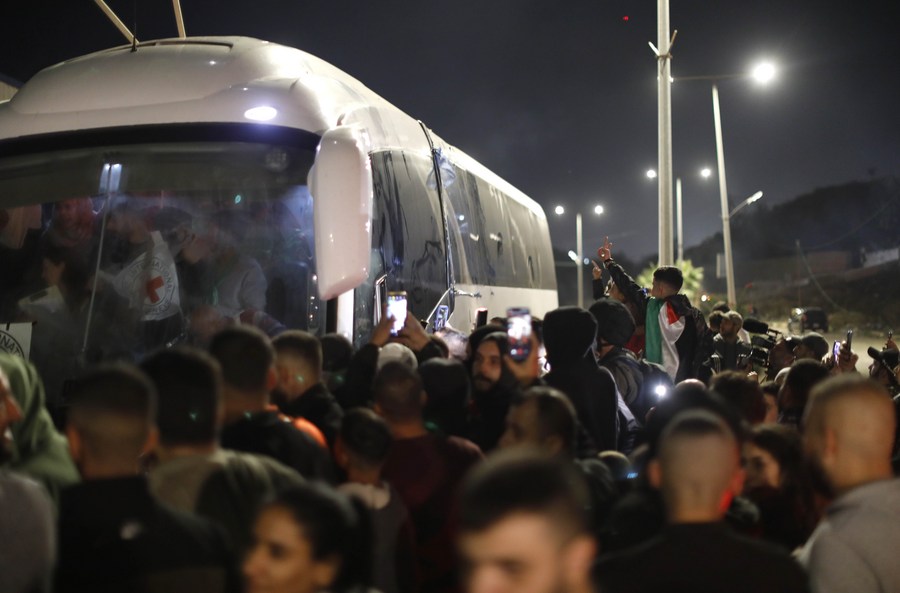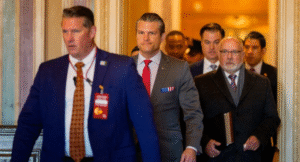
Israel and Hamas entered the planned final day of a four-day cease-fire Monday, with expectations for Israel to release more Palestinian prisoners and Hamas to set free more hostages amid a push to extend the truce.
Hamas has indicated it would extend the deal, while Israeli Prime Minister Benjamin Netanyahu reiterated Sunday that Israel would welcome an extension that included Hamas releasing 10 more hostages per day.
The initial agreement, which went into effect after six weeks of war, included Hamas releasing 50 hostages, Israel freeing 150 Palestinian prisoners, and a pause in fighting.
The United Nations said late Sunday a total of 39 Israelis, 117 Palestinians and 19 foreign nationals had been released.
The United States, Egypt and Qatar are among those advocating for an extension after working to secure the four-day cease-fire.
“That’s my goal, that’s our goal, to keep this pause going beyond tomorrow so that we can continue to see more hostages come out and surge more humanitarian relief into those in need in Gaza,” U.S. President Joe Biden told reporters Sunday.
Biden also welcomed the release of a 4-year-old Israeli American girl whose parents were killed in the Oct. 7 Hamas attack on Israel.
The girl, Abigail Edan, was among 14 Israelis and three foreign nationals turned over to the International Committee of the Red Cross on the third day that Hamas released hostages in exchange for Israel freeing Palestinians who had been jailed for various offenses.
The White House said in a statement that Biden and Netanyahu spoke about the hostage release in a phone call Sunday, and that they discussed the pause in the fighting and surge in additional humanitarian assistance into the Gaza Strip.
The temporary truce is the first halt in the conflict since Hamas, in a surprise attack on Israel on Oct. 7, killed 1,200 people and seized about 240 hostages. Israel in turn vowed to eliminate Hamas and bombarded Gaza with aerial attacks and a ground offensive that Palestinian officials say has killed more than 14,000 people, about 40% of them children.
In Barcelona, EU foreign policy chief Josep Borrell called the four-day truce an “important first step,” but said much more is needed to “alleviate the dire situation in Gaza and to find a way out of the current crisis.”
“The pause should be extended to make it sustainable and long lasting while working for a political solution,” he said Monday at the start of a meeting of the Union for the Mediterranean.
Borrell said the “indiscriminate brutality” of the Hamas attack on Israeli civilians cannot be justified, but said “one horror cannot justify another horror” as he noted the widespread destruction in Gaza from Israel’s military campaign.
Hamas has been designated a terrorist organization by the U.S., United Kingdom, the European Union and others.
China said Monday its top diplomat, Wang Yi, will preside over a Wednesday U.N. Security Council meeting focused on the Israel-Hamas situation.
Chinese foreign ministry spokesperson Wang Wenbin told reporters that China hopes the talks would lead to a cease-fire and an end to the fighting, and alleviate the humanitarian crisis in Gaza.
The pause in fighting has allowed an increase in the badly needed humanitarian aid reaching Gaza, where the U.N. says an estimated 1.7 million people—about three-quarters of the population—are displaced.
The U.N. Office for the Coordination of Humanitarian Affairs said late Sunday that cooking gas reached Gaza but that the amount was still well below what people need.
The agency also continued to describe “overcrowding and poor sanitary conditions” at U.N.-run shelters where half of those forced from their homes by the conflict are staying.






